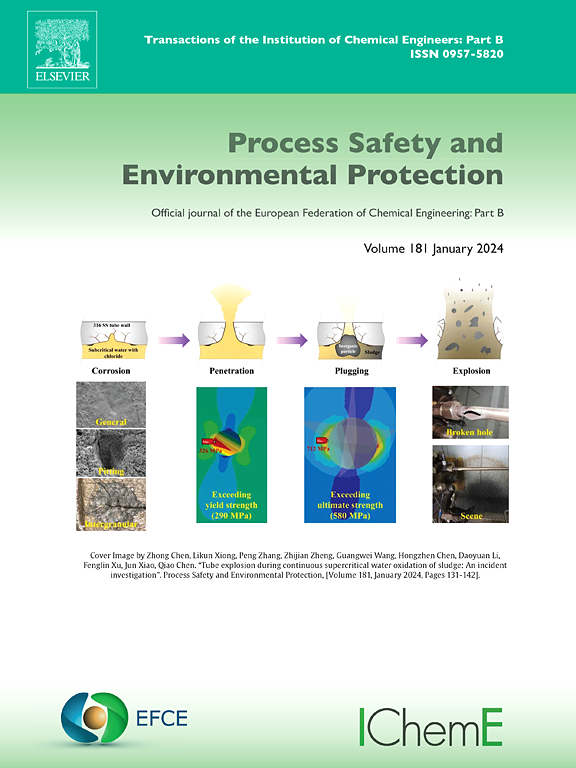Carbonated steel slag as a dual-function additive for strength and sustainability enhancement of alkali-activated slag
IF 7.8
2区 环境科学与生态学
Q1 ENGINEERING, CHEMICAL
引用次数: 0
Abstract
This study investigates carbonated steel slag (CS) as a dual-function additive in NaOH-activated blast furnace slag (AAS) binders, aiming to enhance both mechanical performance and sustainability. Incorporating CS significantly improved compressive strength at all curing ages, with a ∼70 % increase at 28 days for 30 wt% substitution. Microstructural analyses revealed reduced capillary porosity and improved micromechanical properties of C–(A)–S–H. Environmental assessment further showed that CS reduced total CO2 emissions and improved the environmental index by more than 35 %. Mechanistically, CS moderated early-age reaction kinetics through pH buffering, while supplying reactive CaCO3 and silica gels that promoted sustained gel formation. These effects enhanced silicate polymerization and induced Na–Ca carbonate formation, yielding a denser and more stable hybrid gel network. Overall, CS not only improves strength and refines microstructure, but also acts as a CO2 sink, offering a sustainable pathway for developing high-performance, low-carbon AAS binders.
碳酸钢渣作为碱活性渣增强强度和可持续性的双功能添加剂
本研究研究了碳化钢渣(CS)作为naoh活化高炉渣(AAS)粘结剂的双功能添加剂,旨在提高其力学性能和可持续性。加入CS可显著提高所有龄期的抗压强度,替代30 wt%后,28天抗压强度提高约70 %。微观结构分析表明,C - (A) - s - h的毛细管孔隙率降低,微观力学性能提高。环境评估进一步表明,CS减少了二氧化碳排放总量,环境指数提高了35% %以上。从机制上讲,CS通过pH缓冲来减缓早期反应动力学,同时提供活性CaCO3和硅胶,促进持续的凝胶形成。这些效应增强了硅酸盐聚合,诱导了Na-Ca碳酸盐的形成,产生了更致密、更稳定的杂化凝胶网络。综上所述,CS不仅可以提高强度和细化微观结构,还可以作为二氧化碳汇,为开发高性能、低碳的AAS粘合剂提供了可持续的途径。
本文章由计算机程序翻译,如有差异,请以英文原文为准。
求助全文
约1分钟内获得全文
求助全文
来源期刊

Process Safety and Environmental Protection
环境科学-工程:化工
CiteScore
11.40
自引率
15.40%
发文量
929
审稿时长
8.0 months
期刊介绍:
The Process Safety and Environmental Protection (PSEP) journal is a leading international publication that focuses on the publication of high-quality, original research papers in the field of engineering, specifically those related to the safety of industrial processes and environmental protection. The journal encourages submissions that present new developments in safety and environmental aspects, particularly those that show how research findings can be applied in process engineering design and practice.
PSEP is particularly interested in research that brings fresh perspectives to established engineering principles, identifies unsolved problems, or suggests directions for future research. The journal also values contributions that push the boundaries of traditional engineering and welcomes multidisciplinary papers.
PSEP's articles are abstracted and indexed by a range of databases and services, which helps to ensure that the journal's research is accessible and recognized in the academic and professional communities. These databases include ANTE, Chemical Abstracts, Chemical Hazards in Industry, Current Contents, Elsevier Engineering Information database, Pascal Francis, Web of Science, Scopus, Engineering Information Database EnCompass LIT (Elsevier), and INSPEC. This wide coverage facilitates the dissemination of the journal's content to a global audience interested in process safety and environmental engineering.
 求助内容:
求助内容: 应助结果提醒方式:
应助结果提醒方式:


